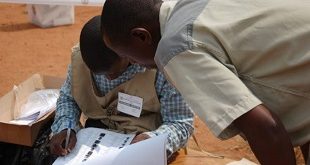
Kampala, Uganda | THE INDEPENDENT | A panel of three Judges of the East African Court of Justice has upheld the removal of the lower and upper presidential age caps from the Constitution of Uganda.
Ugandan citizen Male Mabirizi had petitioned the court challenging the decision by the constitutional and Supreme Courts to uphold the Constitutional Amendment Act 2018. The said Act paved way for scrapping the presidential age limits which were previously at 35 years for the lower and 75 years for the upper limit.
Mabirizi first went to the Constitutional Court together with Uganda Law Society and six opposition MPs and asked for nullification of the Act on grounds that the bill, which eventually led to the Constitutional Amendment Act 2018 was illegally passed. The petitioners argued that the process leading to its enactment was marred with several irregularities like violence, bribery and failure to consult the citizens.
Court also heard that the bill was sent to the Executive for assenting by the Speaker of Parliament, Rebecca Kadaga well knowing that it had errors like an invalid certificate of compliance among other grounds.
But the four of the five-member panel of the Constitutional Court judges ruled that the bill in question was passed lawfully. The five Justices included the then Deputy Chief Justice, Alfonse Owiny Dollo, Cheborion Barishaki, Elizabeth Musoke and Remmy Kasule. It was only Justice Kenneth Kakuru who disagreed with the rest of the judges, arguing that Parliament erred in law and fact when it failed to consult citizens.
However, Mabirizi together with Uganda Law Society and six opposition MPs were not satisfied with the Constitutional Court decision. They decided to petition the Supreme Court. The Supreme Court Judges also upheld the constitutional court judgment in a decision of four against three.
Those who upheld the decision were the Chief Justice Bart Katureebe, Apio Aweri, Stella Arach Amoko and Jotham Tumwesigye. Justices Lillian Tibatemwa, Paul Mugamba and Eldard Mwanguhya disagreed with the Constitutional Court judgement, saying there was no valid certificate of compliance accompanying the Bill.
Again not satisfied with this decision, Mabirizi and the six oppositions MPs petitioned the East African Court of Justice. The court later dismissed the legislators’ appeal before it could be heard after they failed to put in their submissions on time. But Mabirizi in his appeal argued that the actions of the Parliament, Executive and the Judiciary in processing, pursuing and upholding the Constitutional Amendment Act 2018 were unlawful because they had been marred with violence and bribery.
He also argued that the two Ugandan courts had denied him an award of 20 million shillings which had been given to the rest of the six opposition MPs. Court also heard that Mabirizi had been discriminated and sent to sit in the dock and denied access to sit at the bar yet he was representing himself.
Subsequently, Mabirizi asked the East African Court of Justice to declare all the actions by the three arms of government illegal, saying they contravened the provisions of democracy, natural governance and rule of law enshrined in the East African Community treaty.
However, in their Judgement today, a panel of three Judges of East African Court Justice ruled that the actions by the three arms of government of Uganda were lawful. They noted that the actions were neither in contravention with the laws of Uganda nor those of the East African Community Treaty as the appellant, Mabirizi, had indicated.
As a result, the panel that also comprised of Justice Dr Peter Nyawello from South Sudan and Charles Nyachae from Kenya declined to quash the age limit law and also declined to award Mabirizi 20 million shillings’ legal fees. The trio noted that Mabirizi was not entitled to it since he represented himself.
They also denied Mabirizi costs on grounds that while prosecuting his appeal there was no evidence that he went through hardships that would warrant them to do so. On the issue of discrimination from sitting at the bar, the court also heard that Mabirizi is not an Advocate and that he was a litigant in the matter so he should have sat anywhere he could be seen and heard but not sitting at the bar.
The Judges justified their decision reasoning that the code of conduct by lawyers in Uganda does not allow people without a diploma in legal practice like Mabirizi to sit at the bar. On the issue of violence, the Justices noted that the individual MPs are the ones who breached the parliamentary rules of procedure and decorum of parliament but the Speaker tried her best to control it in vain.
Mabirizi had also complained about issues of bias, incompetence and poor eyesight against some of the Ugandan Supreme Court Justices like the former Chief Justice Bart Katureebe; but the court has found that there was no evidence for bias and incompetency allegations.
Instead, they noted that since he had complained that the Supreme Court did not conclude the matter within 60 days’ timeline, the fact that Katureebe was also able to write his own judgement despite the allegations against him, Mabirizi cannot complain that his right to a speedy hearing was violated.
They thus dismissed Mabirizi’s appeal with orders that he should pay the government of Uganda monies it incurred while trying to defend his case.
The Judgement was delivered to the parties via video conferencing in the presence of the appellant Mabirizi and the Attorney General of Uganda William Byaruhanga. The decision by the court now implies that Museveni who recently turned 75 years of age and have ruled Uganda for 35 consecutive years by next year’s election is now eligible to seek election for the sixth term of office and again and again indefinitely.
********
URN
 The Independent Uganda: You get the Truth we Pay the Price
The Independent Uganda: You get the Truth we Pay the Price



